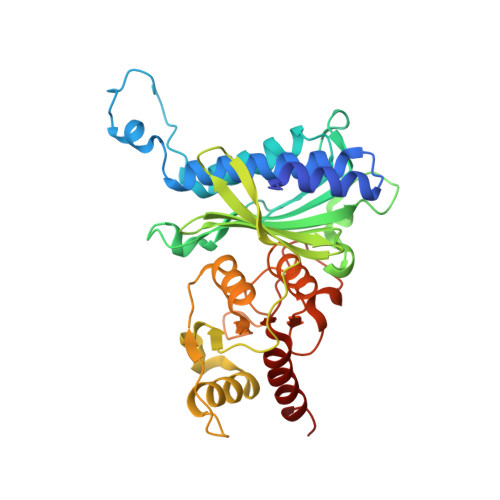Structures of mammalian and bacterial fructose-1,6-bisphosphatase reveal the basis for synergism in AMP/fructose 2,6-bisphosphate inhibition
Hines, J.K., Chen, X., Nix, J.C., Fromm, H.J., Honzatko, R.B.(2007) J Biol Chem 282: 36121-36131
- PubMed: 17933867
- DOI: https://doi.org/10.1074/jbc.M707302200
- Primary Citation of Related Structures:
2QVR, 2QVU, 2QVV - PubMed Abstract:
Fructose-1,6-bisphosphatase (FBPase) operates at a control point in mammalian gluconeogenesis, being inhibited synergistically by fructose 2,6-bisphosphate (Fru-2,6-P(2)) and AMP. AMP and Fru-2,6-P(2) bind to allosteric and active sites, respectively, but the mechanism responsible for AMP/Fru-2,6-P(2) synergy is unclear. Demonstrated here for the first time is a global conformational change in porcine FBPase induced by Fru-2,6-P(2) in the absence of AMP. The Fru-2,6-P(2) complex exhibits a subunit pair rotation of 13 degrees from the R-state (compared with the 15 degrees rotation of the T-state AMP complex) with active site loops in the disengaged conformation. A three-state thermodynamic model in which Fru-2,6-P(2) drives a conformational change to a T-like intermediate state can account for AMP/Fru-2,6-P(2) synergism in mammalian FBPases. AMP and Fru-2,6-P(2) are not synergistic inhibitors of the Type I FBPase from Escherichia coli, and consistent with that model, the complex of E. coli FBPase with Fru-2,6-P(2) remains in the R-state with dynamic loops in the engaged conformation. Evidently in porcine FBPase, the actions of AMP at the allosteric site and Fru-2,6-P(2) at the active site displace engaged dynamic loops by distinct mechanisms, resulting in similar quaternary end-states. Conceivably, Type I FBPases from all eukaryotes may undergo similar global conformational changes in response to Fru-2,6-P(2) ligation.
Organizational Affiliation:
Department of Biochemistry, Biophysics, and Molecular Biology, Iowa State University, Ames, Iowa 50011, USA.

















